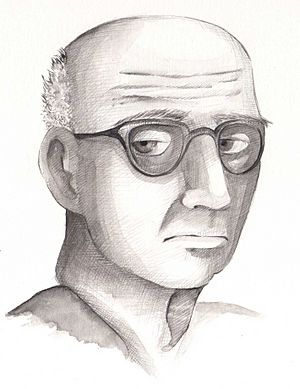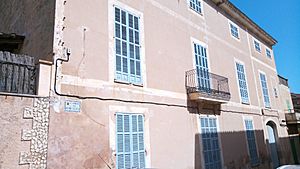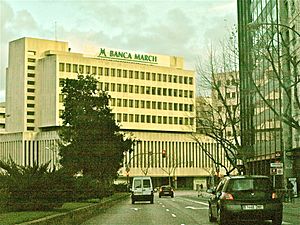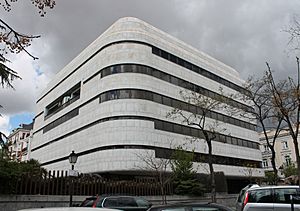Juan March facts for kids
Quick facts for kids
Juan March
|
|
|---|---|

Portrait by Noelia Martín, 2014
|
|
| Born |
Juan March Ordinas
4 October 1880 Santa Margalida, Spain
|
| Died | 10 March 1962 (aged 81) Madrid, Spain
|
| Other names | Joan March i Ordinas |
| Spouse(s) | Leonor Servera |
| Children | Juan March y Servera Bartolomé March y Servera |
| Signature | |
Juan March Ordinas (born October 4, 1880 – died March 10, 1962) was a very powerful Spanish businessman. He was known as a banker and also for his generous acts of giving back to society.
Juan March was one of the richest people in Spain. Some even called him "the Rockefeller of Spain." At one point, he was said to be the sixth richest person in the world.
He came from a humble family in Mallorca. He started working at a young age, helping his father with their pig farm. He also became involved in trading goods, including tobacco.
During World War I, Juan March supplied goods to different groups. He founded Trasmediterránea in 1916. This was a major shipping company that helped his business grow.
He also started Banca March to help fund his many business projects. For a short time, he faced legal troubles and had to leave Spain. He went to Gibraltar for safety.
In 1955, he created the Fundación Juan March. This foundation supports arts, music, and science. It is similar to other famous foundations around the world. Juan March once famously said, "I am so rich, that I do not even know how rich I am." He passed away in 1962 after a road accident.
His family, the March family, has continued to be very influential. They are still among the wealthiest families in Spain today.
Contents
Early Life and Business Growth
Juan March Ordinas was born in Santa Margalida on the island of Majorca. As a young man, he was involved in trading tobacco from North Africa.
During World War I, he supplied goods to both sides. He managed to get around blockades to deliver his products.
His power and influence grew under different Spanish governments. This was during the time of King Alfonso XIII. In 1926, he officially created the Banca March in Majorca.
When the monarchy was replaced by the Second Spanish Republic in 1931, March lost some influence. He faced legal issues because of his business dealings. He later left Spain for Gibraltar. His connections there helped protect him.
Role in Spanish History
Juan March was an important supporter of the military uprising in 1936. This event led to the Spanish Civil War. He helped Francisco Franco travel from the Canary Islands to Spanish Morocco. He also helped move troops to southern Spain.
After the Nationalist side won in 1939, March became even more influential. He was highly favored in Francoist Spain. During World War II, the Allies asked him for help. They wanted him to keep Spain from joining the Axis.
Documents show that in 1941, the British government gave him money. This was to help him influence important Spanish generals.
In 1944, March supported Juan de Borbón, Count of Barcelona. Don Juan wanted to become the King of Spain. Juan March also owned newspapers and helped fund political groups.
After World War II, he was one of the richest men globally. In 1955, he started the Juan March Foundation. This foundation supports the arts, music, and social sciences.
Family Life and Art Collection
Juan March married Leonor Servera (1887–1957). They had two children together. Their names were Juan March Servera and Bartolome March.

March collected a huge amount of art. He started buying books and old writings when he was young. Later, he collected French furniture from the 1700s. He also bought many famous paintings. These included works by Murillo, Goya, and Velázquez. He also owned art by Picasso, Monet, and Van Gogh.
The March family art collection is one of the most important in the world. It is said to be worth over 1 billion US dollars.
The March family remains one of the wealthiest families in Spain. They live in places like Madrid, Majorca, and Gstaad. The Casa March is a large house built by Juan March in 1915. It overlooks Cala Ratjada, Majorca. Its beautiful gardens are open for guided tours.
Barcelona Traction Case
Juan March was known for his clever business methods. He often used his influence to gain advantages. A famous example was his takeover of the Barcelona Traction, Light, and Power Company (BTLP) in 1948.
BTLP was a company that provided electricity and streetcar services in Barcelona. It was owned mostly by investors from Belgium. The company was doing very well and was quite profitable.
However, BTLP had some financial issues. It could not pay interest on some bonds because of Spanish currency rules. Juan March saw an opportunity in this situation.
Agents secretly working for him bought up many of these bonds. Then, in 1948, they went to a Spanish court. They claimed BTLP had not paid its debts and asked for control of the company. The judge agreed, and Juan March gained ownership of BTLP's valuable assets.
The foreign investors tried to appeal this decision. But they did not get help from Spanish courts. The Belgian government even took the case to the International Court of Justice. However, the final decision came in 1970, after March had passed away.
Legacy
Juan March is remembered in the scientific name of a Spanish lizard. It is called Algyroides marchi. The Fundación Juan March is now a very important foundation. It helps develop culture and science in Spain.
See also
 In Spanish: Juan March para niños
In Spanish: Juan March para niños



